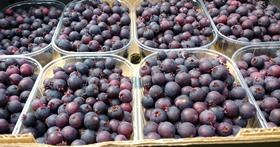
A juneberry looks like a cross between a blackcurrant and a blueberry, it’s slightly larger than the latter, and it has a sweet flavour with almond notes. But if you asked most people in the fresh produce industry to identify this lesser-known berry, they probably wouldn’t stand a chance.
Juneberries might be big in Canada – in the province of Manitoba they are the second largest soft-fruit crop after strawberries – but in the UK they are still largely unknown. In 2015, Sophie Sidaway became the first, and only, commercial producer in the country, adding 3,500 saplings to her 300-tree trial orchard in the Vale of Evesham, Worcestershire.
With the older generation of growers in the area passing on, and a dearth of young growers coming through to replace them, the former gardener says she wanted to “grow something new and exciting to inspire the next generation”. Having recently completed a course in organics at Pershore College in her home county, she was excited when she discovered the environmentally-friendly juneberry.
“I wanted to grow something that has very little impact on the local area,” Sidaway says. “With juneberries you don’t have to extract water from rivers for irrigation, you don’t need polytunnels, and you don’t have to order in substrate all the time. I’ve managed them without chemicals so far,” she adds. “I just place a net over the top to stop the birds eating them.”
After a visit to an allotment in Dundee and a two-year trial at her base in Worcestershire, Sidaway launched her business, Pershore Juneberries, with support from her former college. Since then, she has been growing, picking, packing and marketing the fruit single-handedly, with yields doubling year on year. “The trees don’t get into full swing until years six to eight,” Sidaway explains, with volumes remaining consistent thereafter. “Last year we had more fruit than we could sell, so we kept some of the harvest behind to make a few extra products – cocktail syrup, vinegar, that sort of thing.”
The biggest seller among these is the cocktail syrup, which goes well with prosecco or gin and tonic, Sidaway says. But fresh product still accounts for the bulk of the grower’s sales, and overall yields are expected to rise to around 600kg this season.
The business’s main customers are local farm shops and wholesalers, including New Covent Garden’s First Choice Produce, with the niche fruit found increasingly in high-end restaurant dishes. London-based chef Ben Spalding, who pairs sharing plates with live electronic music at his all-day ‘Small Plate Sessions’ in London, has been central to endorsing the product. But Sidaway’s challenge, as awareness of the product slowly starts to build, will be to stand out against the mainstream products in the soft-fruit category – all of which are enjoying strong year-on-year sales growth.
“Last year was difficult because there was a glut of blueberries during the juneberry season,” Sidaway says. “It was difficult for the wholesalers to persuade their customers to buy juneberries instead of blueberries. And in the end most of my fruit was sold wholesale for less than I paid the picker to help me.”
Despite such challenges, she is confident that in the long term juneberries can be a major player. “I think juneberries have the potential to be the next blueberries,” she says. “They can be grown in the UK, there are very few food miles involved, and inputs are minimal.” The health benefits too are difficult to argue with – each berry contains twice the fibre, potassium, iron and antioxidants of a blueberry. Juneberries have all the potential to be the next success story in the burgeoning berry bracket, but success comes with scale and at the moment it’s only a one-man band. “I’m still putting them in the punnets myself,” Sidaway laughs.



